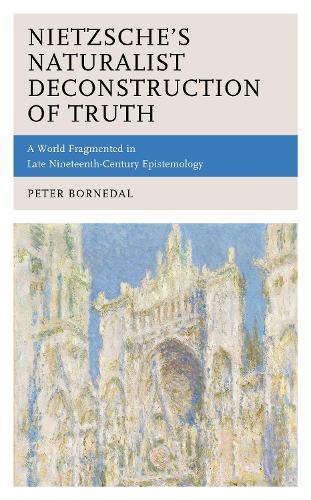
Nietzsche's Naturalist Deconstruction of Truth: A World Fragmented in Late Nineteenth-Century Epistemology
(Hardback)
Available Formats
Publishing Details
Nietzsche's Naturalist Deconstruction of Truth: A World Fragmented in Late Nineteenth-Century Epistemology
By (Author) Peter Bornedal
Bloomsbury Publishing PLC
Lexington Books
3rd January 2020
United States
Classifications
Professional and Scholarly
Non Fiction
193
Physical Properties
Hardback
300
Width 161mm, Height 228mm, Spine 22mm
585g
Description
Nietzsches Naturalist Deconstruction of Truth: A World Fragmented in Late Nineteenth-Century Epistemology offers a new interpretation of Nietzsches discussions of truth and knowledge, covering the period from his early essay On Truth and Lies in an Extra-Moral Sense to his late notebooks. It places these discussions in the context of the neo-Kantian, Naturalist, Positivist, and Pragmatic schools influential in Nietzsches late nineteenth-century Europe. Peter Bornedal argues for a view of Nietzsches epistemological thinking as elaborations of this paradigm: proposing ideas that are anti-metaphysical and anti-theological in their polemic orientation, and in general promoting new scientific naturalist ideals in the discussions of knowledge. Bornedal suggests that the rational pursuit of these new ideals to the unencumbered mind logically leads to Nihilism in its most profound epistemological sense. Nietzsches critique of metaphysics is thus seen as springing from sources different from and sometimes in patent opposition to more recent postmodern and deconstructionist critiques of metaphysics. This book contextualizes Nietzsche in relation to a number of philosophical peers and juxtaposes him to contemporary thinkers in a way that resolves some of the difficulties that have plagued recent Nietzsche scholarship.
Reviews
This careful, informed and clear critique of the trendy deconstruction of Nietzsche's view of truth provides a serious defense of what Peter Bornedal describes as a broadly naturalist paradigm. Anyone with an interest in Nietzsche will profit by reading this book. -- Tom Rockmore, Duquesne University
Author Bio
Peter Bornedal is professor at American University of Beirut
